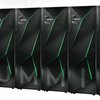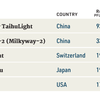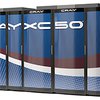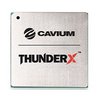Episode 201: Addison Snell and Michael Feldman are joined by guests Horst Simon of Lawrence Berkeley National Lab and Don Becker as they talk TOP500, SC17 early highlights, and the Beowulf Bash.
While vendors are busy announcing new HPC offerings at this weeks Supercomputing Conference (SC17), Intel announced it is removing its next-generation Knights Hill Xeon Phi product from its roadmap. And that might just be the beginning.
Summit, the most powerful supercomputer in the United States, is currently under construction at the US Department of Energys Oak Ridge National Lab (ORNL). ORNL director Thomas Zacharia updates us onits status and reveals the opportunities the new machine will provide scientists when it comes online next summer.
The fiftieth TOP500 list of the fastest supercomputers in the world has China overtaking the US in the total number of ranked systems by a margin of 202 to 143. It is the largest number of supercomputers China has ever claimed on the TOP500 ranking, with the US presence shrinking to its lowest level since the lists inception 25 years ago.
Cray has announced it is offering an ARM blade option on its XC50 supercomputer, which will be based on Caviums second-generation ThunderX2 processor.
IBM has revealed it has a working prototype of 50-qubit quantum computer, along with a 20-qubit system that will be made available to clients before the end of the year.
Episode 200: Addison Snell and Michael Feldman predict the hot trends and topics of SC17.
Episode 199: Addison Snell and Michael Feldman give their analysis of the HPE Superdome NUMA upgrade and Australia's Raijin upgrade.
On Tuesday, November 14, attendees to this years Supercomputing Conference (SC17) keynote address will get an in-depth look into the Square Kilometre Array (SKA) Project, one of the most ambitious international research efforts ever undertaken. We talked with SKA principles Professor Phil Diamond and Dr. Rosie Bolton about what the project entails and what kinds of supercomputing resources that will be needed to drive the science.
The University of Michigan isdeploying a $3.5 million big data compute cluster powered by Caviums ARM ThunderX SoC.







